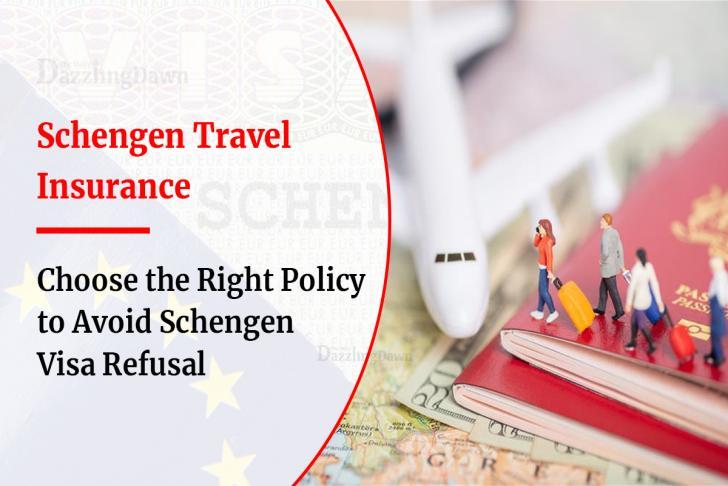All citizens of third countries who apply for a Schengen visa are required to have Schengen travel insurance, per Regulation (EC) No 810/2009 of the European Parliament.
Applicants for Schengen visas can explore the Schengen Area worry-free in the event of unanticipated medical emergency by acquiring travel insurance.
In addition to organising their travel within the bloc and preparing all the necessary paperwork, applicants for Schengen visas must make sure they are insured for any potential medical costs.
The requirement to purchase travel insurance applies to all travellers who apply for a Schengen visa for tourism, business, study, or visit purposes, among others, regardless of their stay in the area.
In case Schengen visa applicants do not purchase travel insurance, their visa application is rejected. The wrong policy can also penalise Schengen visa applicants.
Remember This When Buying Insurance for Schengen Visas
Schengen visa applicants have access to a wide range of travel insurance plans, but in order to prevent unfavourable consequences from the wrong policy, it is crucial that certain conditions are fulfilled.
Current EU regulations stipulate that a Schengen visa holder's travel insurance coverage must pay for at least €30,000 in medical expenses, including emergency care, hospital stays, and medical evacuation.
Furthermore, regardless of whether applicants for Schengen visas intend to visit more than one Schengen country, the travel insurance policy must be valid in all Schengen member states.
Another thing that all Schengen visa applicants must have in mind when purchasing travel insurance is that the policy must cover the entire stay in the Schengen Area.
Those who plan on reaching the Schengen Area multiple times within a short period are recommended to purchase policies with a longer validity so that they do not have to purchase policies each time they want to travel to the Schengen Area.
Which Type of Travel Insurance Coverage Is Best for You?
Numerous businesses on the market provide various travel insurance plans according to the requirements of passengers.
Travellers should, however, choose the maximum amount they want their insurance to cover, establish a spending limit, and research policies from several providers to identify the best fit for their needs before selecting one.
Moreover, travellers must ensure that the company they are deciding to purchase travel insurance from is licensed and approved by the Schengen embassies and consulates so they do not experience any last-minute inconveniences.
Some of the licensed companies that offer the best travel insurance policies are Europ Assistance, Mutuaide, Allianz Travel, and AXA.
Based on travellers’ needs and budgets, each of these companies offers different policies.
Europ Assistance
Europ Assistance offers Schengen and Schengen Plus travel insurance policies with a €0 deductible.
Europ Assistance Schengen covers trips in the entire territory of the Schengen Area and offers assistance in the event of illness or injury of up to €30,000, with prices starting as low as €3 per day.
On the other hand, Europ Assistance Schengen Plus covers trips in the Schengen Area and EU countries, with assistance of up to €60,000 in the event of illness or injury.
Prices for this policy start from around €5 per day, and the policy also includes the return and lodging expenses of a companion.
Mutuaide Basic
Mutuaide Basic offers worldwide coverage, and it covers medical expenses abroad up to €30,000. This policy is perfect for sports enthusiasts as it covers search and rescue costs.
The cost of a Mutuaide Basic medical insurance policy starts from €3 per day for a ten-day trip and has a €0 deductible.
However, travellers must keep in mind that this policy is valid only for a single trip.
Allianz Travel
For those who fear that their luggage might get lost Allianz Serenity is the perfect travel insurance policy as, among others, it includes luggage insurance.
Allianz Serenity has coverage for medical expenses up to €30,000, and it also covers sports-related search and rescue costs.
The price for this policy starts from €7 per day for a seven-day trip. The difference between this policy and the others mentioned above is that Allianz Serenity has a deductible from around €30 to €100.
AXA
AXA offers AXA Silver, AXA Gold, and AXA Platinum travel insurance policies with a €30-€50 deductible.
With the price starting from €4,50 per day for 7-day trips, AXA Silver covers medical expenses up to €30,000 when abroad.
On the other hand, AXA Gold covers medical expenses abroad up to €50,000. This policy’s cost is higher – €6,35 per day – as, in addition to the Schengen Area, it also covers the French overseas territories, Cyprus, Ireland, and the UK.
In addition, AXA Gold offers air ticket cancellation and luggage insurance and covers sports-related search and rescue costs together with terrorism and COVID-19 costs.
Lastly, AXA Platinum covers the highest amount of medical expenses compared to the other policies mentioned above – up to €100,000.
This policy covers the same area as AXA Gold and covers the same expenses. However, the policy is designed mainly for those who want to purchase travel insurance for a longer period.
AXA Platinum travel insurance policy costs start from €3,75 per day for a 12-day trip.
What Else Is Included in Schengen Medical Insurance Policies?
A good travel insurance coverage will typically cover not just medical expenses but also emergency evacuation, repatriation of remains, minors' returns, accidental deaths, and foreign funeral expenses.
Certain travel insurance providers also cover additional expenses, even though they don't all provide the same services. But sometimes, visitors need to get extra insurance to cover specific expenses in order to benefit from a wide variety of coverage.
There are situations when pre-existing medical illnesses like diabetes and asthma, as well as risky hobbies like skiing and scuba diving, need the purchase of additional insurance.
Moreover, additional insurance, in some instances, must also be purchased when travelling to high-risk countries.
On the other hand, travel insurance policies might exclude coverage for self-inflicted injuries and substance abuse, among others.
When Is the Best Time to Purchase Schengen Travel Insurance?
The best time to purchase travel medical insurance is immediately after travellers have completed their travel arrangements but have not attended the visa interview yet.
It is highly recommended that travellers planning to visit the Schengen Area know, if not exactly, at least approximately when they will enter and when they will leave the zone.
This will help them to purchase travel insurance for the entire period of their stay in the Schengen Area.
In addition, it is key that travellers who have filed a Schengen visa application purchase travel insurance before attending the visa interview. This is because proof of having purchased travel insurance needs to be submitted to the embassy/consulate along with the other documents.
While Schengen travel insurance is mandatory for nationals of third countries who need to apply for a visa for the purpose of entering the Schengen Area, the case is not the same for those who can travel under a visa-free regime.
Travellers who enjoy visa-free travel to the Schengen Area are not required to purchase travel insurance. Nonetheless, it is highly recommended they do.
Common Mistakes to Avoid
Even though travel insurance is a mandatory requirement, Schengen visa applicants often purchase policies without putting much thought into it.
Some of the common mistakes that must be avoided when purchasing Schengen visa insurance are as follows:
Not checking coverage requirements: in line with Regulation (EC) No 810/2009 of the EU Parliament, Schengen travel insurance must have a minimum coverage of medical costs of €30,000. In addition, the same regulation requires that the travel insurance covers all Schengen Area member states as well as covers expenses arising from repatriation for medical reasons, emergency hospital treatment, or death.
Ignoring policy validity dates: travellers must make sure that the travel insurance is valid throughout their entire stay in the Schengen Area. The policy must cover the entire period of stay in the zone, whether the stay lasts only a day or a maximum of 90 days.
Choosing the cheapest policy: travellers often look for the cheapest travel insurance policy. While saving some money sounds good, cheap policies, in some cases, might not meet all the requirements. This does not necessarily mean that travellers should choose an expensive travel insurance policy.
However, they should make sure that more affordable travel insurance policies meet all the criteria set by the EU and should consider the quality and adequacy of the coverage so that they do not encounter potential issues later on.
Last-minute purchases: travellers are recommended not to wait until the last minute to purchase travel medical insurance. It is highly advised that they start researching ahead of time to be able to make comparisons between different policies and choose the one that fits their needs best.
Providing false personal details: it is advised that all travellers do not provide any false information when purchasing travel insurance. False information may lead to claim rejection.
Hiding medical history: travellers should declare all their medical conditions as they may not be covered if they fall ill during their stay in the Schengen Area and the illness is linked to a pre-existing medical condition. By disclosing all pre-existing medical conditions, travellers ensure that they are covered and are able to choose the right policy for them.
Neglecting limitations and exclusions of policies: the policies should be carefully reviewed to be well-informed of the limitations and exclusions. This helps to understand what is covered and what is not covered. Special attention should be paid to exclusions related to pre-existing medical conditions, sports with an element of risk, and other circumstances that may affect the coverage.
Overlooking the insurance provider’s reputation: it is very important that travellers check the provider’s reputation and do their own research before deciding to purchase a travel insurance policy from a certain provider. Travellers can look for ratings, reviews, as well as feedback from others who have already purchased travel insurance policies from the provider they are considering.




_3.jpg)



.svg)



_2.jpg)